- Home
- Lloyd Jones
See How They Run Page 2
See How They Run Read online
Page 2
We always celebrate when we beat the Welsh, said her silhouette at the other end of the room. She sat bolt upright, shoulders held high, her hands placed magisterially in front of her, framing the fish fork and the soup spoon. A dinner service, hand-painted with the famous trellis shamrock, caught the fire of the sun on an adjacent table. Surely she knew all the old supper party songs: Pale hands I loved, beside the Shalimar; or maybe a John McCormack classic, The harp that once through Tara’s halls...
Behind her lapped the medieval sea which Gerald of Wales had seen, menaced by a giant whirlpool sucking at passing ships; behind them both lay the holy land of Ireland, stalked by Gerald’s talking wolves, women with beards, wandering bells, vindictive saints, creatures which were half ox half man; geese which hatched from barnacles growing on gum trees, and a rude, musical peasantry sustained by miracles and bestiality. The old, primitive shadows were still there, but vestigal now. Outside, framed by the window, he imagined an enormous pair of legs disappearing into the clouds. Huge knees, scarred and raw. He could smell the mossy, earthy leather of the house-sized cordovan boots; and waving slowly in the air, reminding him of seaweed moving with the tide, body hair as thick as jungle vines.
She gave him what he wanted, in the crystaline light of spring, a severe woman without any grief left to show, stripped of it, a bleached bone in a cyst.
Her son had collapsed suddenly during a lecture, clutching his left shoulder. Not yet fifty, her brilliant offspring had gone to the otherworld. Dr Dermot Feeney, who had risen from being a clerk in a shipping office, who had worked himself up from nowhere, had been too busy in his stone-lined study to beget a family, despite his mother’s pleas. So Dermot Feeney, launched from this woman’s thighs less than fifty years ago, had died intestate and without issue; his sole bequest a thick wad of paper containing his life’s work, accompanied by a slender memory stick, also containing his life’s work. A pencilled note had said: In the event of my death, please deliver this to Dr Llwyd McNamara, requesting him to complete my book. Taking the package from a drawer, she deposited it on the corner of the table near his right hand and went back to her seat. Feeney’s magnum opus was now in Lou’s sole possession; the note was still there on the cover, in a forward-slanting script; the man had been in a mighty hurry. Lou already imagined its scholarly pages drifting on the mid-channel breeze, heading one by one towards a soggy funeral in the Irish Sea. Poor silly pup, thought Lou, to entrust his work to a rival – his biggest rival. The memory stick, lizard green and semi-opaque, reminded him of his childhood swatch. It was rather beautiful, nicely proportioned, slightly sad. No manufacturer’s name, merely a symbol showing radiating waves and the letters 4GB. The snap lid was pleasantly coved rather than straight, and the other end had an eyelet. Lou took it in the palm of his hand and admired it, a coffin of memories lying there. Someone else’s memories; someone else’s lifeblood in a fragment of plastic. Dimly, he could see its inner workings; rows of tiny components glinting like a canteen of silvery fish in a milky green sea. This was what he’d come for; another man’s genius, so that he could destroy it. Dr Feeney had been his main rival in their chosen arena, the history of Celtic sport; Dr Feeney had also beaten him to it with a much-discussed but as-yet unpublished history of the Irish tragedy. It was vaunted as the definitive work on Big M, or Your Man as he was known in Ireland, the Man being a convenient shorthand for his perplexing middle name, Manawydan, passed on from father to son for countless generations before it lodged latterly between Dylan and Jones in a South Wales valley. The little lad had made a lot of noise as he came down the tunnel, but right from the start he’d looked every inch the famous second row forward he became. He’d come out with a headband and cauliflower ears, said the wags at the Miners Arms. The broken nose came later, on his first day at nursery school. So said the hairy little giants who propped up the bar at the Miners Arms. But they didn’t know, back then, about the mouse tattoo; that titbit of news was still down a hole, waiting to be caught...
Lou backed out of this palace from the past as soon as decency allowed and escaped to Dublin, thrusting the package into his backpack, a washed-out old Karrimor inherited from his ma. He zipped the memory stick into his anorak’s inner pocket. When they reached Doheny and Nesbitt’s in Lower Baggot Street he was stung for a rake of cash by the taximan, and he started to haggle on the pavement, but gave up immediately when the man got out and stretched to his full length, leaning towards him with his huge elbows on the roof of the car. Lou was a sensible man or a coward; he’d not decided which yet.
The pub was packed, already stir crazy, and most of his colleagues were steaming. He tried to catch up with them by downing a few double whiskeys along with his Guinness, and by half time an early numbness had set in. With three converted penalties apiece, the sides were level. Lou enjoyed rugby as much as the next baboon, but not under these conditions; his mob had arrived early enough to get seats, but when he got crushed up against a panelled wall, Lou abandoned hope and went outside to get some air. There was nowhere to sit there either, so leaving the roar of the second half behind him he broke one of his golden rules and entered a nearby burger joint, where he sat alone with a carton of chips. Deciding to stay for a while, he fished Feeney’s masterpiece from his bag and took a quick decco. It seemed to start with some utter nonsense, an introduction comparing rugby to the great mythological cycles of Celtic prehistory. Whereas Ireland and Wales, and to a lesser extent Scotland, had a rich mythological base, England had no native tradition. Beowulf and the other texts had come from the continent. As a result, England had colonised and pillaged other cultures for their myths.
Was the man bonkers? Had Lou crossed the Irish Sea to read this?
Feeney hadn’t finished: because the English were great collectors and annotators, they’d given all they’d acquired abroad a clear structure, pedantic but highly organised, and this was reflected in the way they played rugby: the English side was always efficient and persistent in a well-drilled way, whereas the Celts were prone to disorder, like their myth cycles, relying on brilliant passages of swift movement and extemporised personal genius.
What? Lou laughed out loud, causing the staff to fall silent and stare at him bovinely before their corporate manners returned to them. He shuffled through the manuscript, took in some of the tone, then bagged it again and returned to the pub. The Welsh crowd was even drunker now, less than ten still able to talk and the rest gaga with drink after a ferocious drinking match against the locals. Wales had won the game in the dying seconds, apparently, though Lou cared nothing about that now; he just wanted to get out of there. Eventually they left the fallen and headed for Hotel Oblivion.
Next day they left Ireland, only a small group by now; no one knew what had happened to the others, no one cared much either. Someone was passing a bottle round, Bushmills Red, and they were catching up again. As they left harbour the country disappeared into mist, but that could have been the drink. Lou went up on deck and saw his mother’s homeland ebb away from him; shrinking slowly, he became a boy again. His ma was tickling him and blowing in his ear and he was beginning to cry, he was shouting stop ma or I’ll wet meself and she was doing raspberries in his ear; and then he felt sad and lonely and a bit sick, the Bushmills an oilslick on the strand of his tongue. When the girl with the red dragon hat came up on deck again for a fag he tried it on but she turned on him.
He moved away from her and stood at the rail, his ears absorbing the murmur of the sea, swash and spindrift spraying the ship’s sides, and into his mind came a few words from ‘The Seafarer’...
how I wandered for a wretched winter on the ice-cold sea, exiled, bereft of friends, harnessed in frost, showered in hail...
He retched over the side and watched the girl waddle away in the shimmer of his own spew-tears. What a mess. Heave. What a hopeless shit he was. Heave.
He made paper planes with a dozen or so sheets from Dermot Feeney’s famous book, watched them plunge down to
the water; a few fluttered on deck. After a while he lost patience, tossed the rest over the rail and watched them scatter away, a flock of A4 seagulls. They made a pattern of shrouds on the water. Some of the sheets wrapped themselves around funnels and spars; he watched them dispassionately, waiting for them to slip away. Grasping the rails, he observed the cosmos of the sea again, and its faraway dots passing slowly from port to starboard, towards the horizon. Ships in the night. Noah a distant fleck, a mote in the eye of history. The Fir Bolg arriving, or maybe Tuatha De Danann. Saint Brendan the Navigator, on his seven-year voyage to the Isle of the Blessed with his cargo of fourteen pilgrims and three unbelievers. Over there, moving ever so slowly beneath a vast blue-grey dome. All dead now. Lou felt the memory stick through the fabric of his anorak and considered its fate. Over the side? But no, it was so pretty and mystical. A man’s mind in a morsel. Great mind, nano technology. And as for Lou... nano mind, great technology?
It took forever to get home, it felt like years. For a while they sat in a pub on Holy Island, waiting for Holyhead to arrive in the new world, but that never looked likely so they caught a train and went to sleep. Lou woke up in Chester, caught another train back home. Some of them, apparently, went all the way to London, asleep like flamingoes with crooked necks, waking up with enormous, head-banging hangovers in Euston. Bloody chaos.
Catrin was surprisingly good about it. Just a touch of sarcasm when she opened the door.
Home is the hero, she said softly.
He observed the newly apparent swell of her belly and smiled a foolish, boyish smile.
Did that happen while I was away, he asked, for the bump seemed more obvious.
She kissed him on the cheek, almost mumsily, in the hallway, then ordered him upstairs for a shower. He woke the next morning on a large bean cushion in the new nursery, fresh paint trickling through his nostrils. He must have gone there after the shower, feeling emotional still. He lay on his side, looking at his handiwork, his commitment to biology. A big man in a baby’s room. The tsunami of biology, a huge pheremonal wave crossing the universe. Each procreation was only a small piece of flotsam, really. What had he done? Lou noticed that his eyes were damp. His life was out of control and he was having a problem with scale again. Now he was inside the memory stick, in a small boat with a man, fishing. Long ago. And he wondered who that man was.
II
He was back in his room, the same old room, but the world around him had changed. The Irish trip had left a strange echo in his head, and the old simplicities had gone. He seemed to be two people now: the old Lou, whom he still mostly liked, and a new Lou, malevolent and cunning. He seemed to be morphing, and symptoms included an insecurity with scale and perspective. Was he a big man or a small man? One moment he seemed to be standing on the deck of a ferry in the Irish Sea, the next he was on the deck of a midget ferry crossing his computer screen.
And the sky had grown; it was huge, beyond human comprehension. The sky was the main arena now – a massive amphitheatre in which his own little life seemed utterly insignificant. Perhaps he’d spent too much time inside the micro-world of his computer, having fallen like everyone else into an eat-me, drink-me rabbit hole. Or perhaps it was Big M who was responsible, though he’d be an old man by now, if he was alive at all. He’d been such a big man, in every way. Physically big, mentally big, emotionally big. People had loved him, lots of people. And Lou? How many people had loved Lou? Not so many, really. His baby in Catrin’s womb, would that baby love him most of all?
Back at his desk he felt a new sensation: his beehive cell at the college had changed into a dungeon. Stuck in there, sealed in his honeyless wax hexagon, would he be able to write a book about a hero, or would he take the easy route and destroy Feeney’s masterpiece?
Lou logged on and waited for his bunch of daffs to appear.
He’d already put the Irish memory stick on his desk and he took it up now, cradled it in his left hand and lifted it right up to his eyes, so that he could study it closely, as a giant Gulliver might study a Lilliputian or a Blefuscudian. In this light it looked like a tiny see-through mummy, embalmed in green plastic, with mechanical entrails and two blank little eyes where the stick connected to the computer. There was an intriguing double row of numbers on the flip side: they had to mean something to someone, he thought. Looking at the stick from the obverse side, its inner workings looked like a car park viewed from high above, with rows of identical, miniscule vehicles parked in neat silvery lines. Their virtual owners would be inside the stick somewhere, he thought, tinkering about with circuit testers and almost-invisible screwdrivers. Men in white coats and intelligent-looking scientific specs, as per the television adverts. Stock images. Clipboards and security swipe-cards. Doctorates from cyber universities.
Lou slipped the stick into one of the USB ports and opened it up. There were three folders, entitled M1, M2 and M3. A simple soul, Dermot Feeney. And stupid: his life’s work had just entered a twilight zone of extreme vulnerability; with a few deft movements and double clicks, Lou could eradicate a whole brain’s volume of knowledge. The thought of it. The sheer naked power of it.
Instead, he copied the files onto his desktop and left the originals in the memory stick. For now. Those little scientists would be running around inside, having a massive panic attack, someone shouting who the feck did that with a Galway accent. Claxons sounding, red lights flashing above doors. Then the all-clear. A smooth female voice, texture of melting chocolate. Will the quantum version of Dr Dermot Feeney please go to USB port three. Everyone else can stand down now, the emergency is over. Our precious hives have been borrowed by a higher agency, a mouse-god going by the name of Llwyd McNamara, stealer of honey. Go back to your cars, take the day off. Better still, retire. Enjoy a picnic with your families in the sylvan groves which lie, reputedly, in the green memory sticks of your forefathers. Live life to the full. Throw down your notional, almost imperceptible tools. Workers of the cyber-world unite; you have nothing to lose but your micro-chains.
In his head, Lou heard the soft scuff of many tiny soles on corridor floors as the internees fled. He almost removed the stick to check it. Llwyd McNamara, he said to himself, you’re losing the plot m’boy. Whilst imagining this cyber activity he fiddled about with Feeney’s chapters, trying to find the best place for them on his screen; he settled, eventually, on the bottom right-hand corner. They looked like three fresh tombstones in a cyber cemetery; perhaps he ought to have a nice white wall around them and a slate-roofed lych gate. A line of black cars, and a chrysanthemum wreath spelling out the name Dermot. Would that be possible? He could always ask IT, make a joke of it.
A fly landed on the screen, on a daffodil trumpet, and squatted motionlessly on the picture. He wafted it away, but it bothered him now, so he followed it around the room. Lou McNamara, small game hunter. Why didn’t he leave it alone? In no time at all it’d be gone through a window but no, Lou couldn’t stop himself. Picking up a magazine on the way, he splatted it on the main window, smearing it in an impasto paste on the glass; its viscera reminded him of the memory stick’s innards. Then he reproached himself for inflicting death on a hapless animal much smaller than himself; a pall of self-disgust clasped his head and pushed him down into his chair. He thought of his little baby in Catrin’s womb and made many imprecations, beseeching all powers above and below for a safe passage through this world and the next for himself and his progeny. Closing his eyes, he channelled his thoughts towards the Blakean gods up there in the soft white cirrus clouds between his brain and the bone cupola of his skull, gods with flowing locks who looked down on man from the softly illuminated skies of the dura mater. He begged them to ignore the assassination of the fly and to spare his baby in any similar scenario which might occur in future days, whensoever and whenas his dear wee babbie might be threatened by a huge magazine-wielding psychopath, simian or otherwise. There were no gods there really, thought Lou, but it was just as well to play safe. As he’d
noted in his academic paper, all the gods in his head seemed to be elderly downward-looking gentlemen with lots of nice wavy hair plus the muscle tone of those sunburnt bikers with white horseshoe moustaches, all well past seventy, who were minded to live for ever on the trailer parks of Miami. And then there was the Greek scenario, with a posse of unpredictable gods milling around in the human world like a gang of moody teenagers indulging in a spot of cider ’n pills mayhem down at the local park. Was there a heaven or a hell? One of his colleagues had remarked that the only likely difference between the two was that one had wi-fi and the other didn’t.
Down to business. Opening the first file, M1, he scrolled through it at speed to get the gist of things. Much of it he knew in outline, but some of the details were fascinating.
Big M, or Your Man to the Irish and Little Manny to the English, tilting at irony, had been the second-best rugby player of his generation in the world. The best, by a thin patina of cold mud, had been his brother, Ben. They’d played together in the Welsh side during the glory years, a monstrous, mythical side which was never beaten, breaking record after record. Unusually large for a hooker, brother Ben had captained the side and led by example from the front. Ferociously fit and strong, he had a good head on him too, and his brilliant tacticianship had inspired quaking fear in every side they’d played against. His public nickname was the bridge, because his team mates frequently walked right over him, quite literally, during their rolling mauls, leaving him spread-eagled in the mud. His private pet name was the blind mouse because the little rodent tattooed in blue on his chest had no eyes; he’d left the tattoo parlour in a hurry, for reasons unknown, though he was a lusty man and it could have been a passing girl who’d caught his fancy. Feeney also asserted that Ben’s mouse was the origin of the phrase playing a blinder.

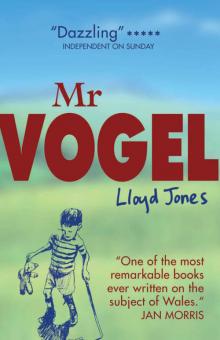 Mr Vogel
Mr Vogel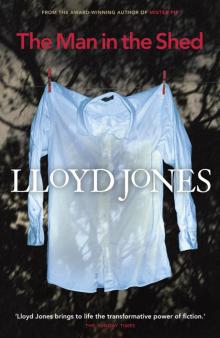 The Man in the Shed
The Man in the Shed Mister Pip
Mister Pip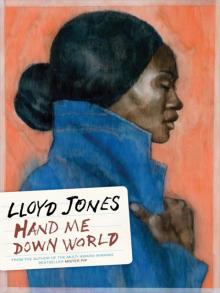 Hand Me Down World
Hand Me Down World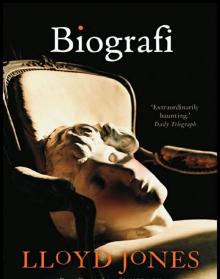 Biografi
Biografi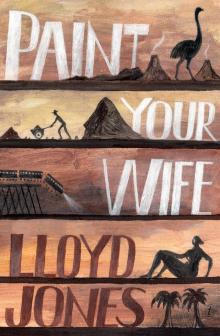 Paint Your Wife
Paint Your Wife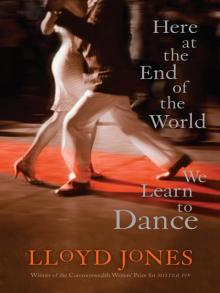 Here at the End of the World We Learn to Dance
Here at the End of the World We Learn to Dance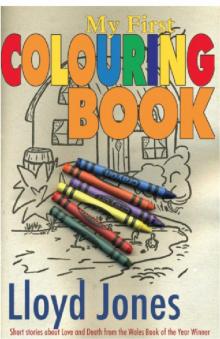 My First Colouring Book
My First Colouring Book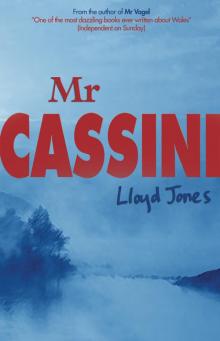 Mr Cassini
Mr Cassini See How They Run
See How They Run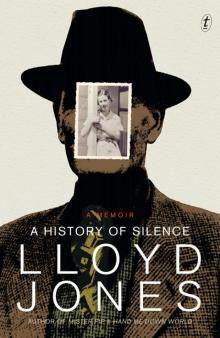 A History of Silence
A History of Silence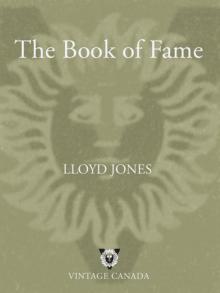 The Book of Fame
The Book of Fame